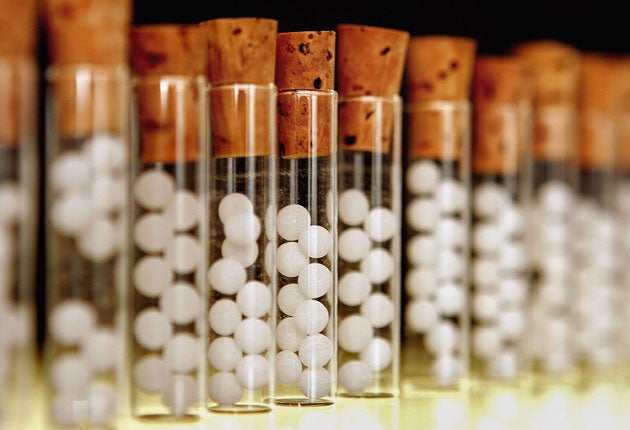Steve Connor: The placebo effect – now on the NHS
Lab Notes

Imagine going to see an NHS doctor with a serious illness, and coming away with a prescription for sugar pills. Now imagine that you had no idea that the medicine was nothing more than sugar, and that you were deliberately kept in the dark about the contents of those pills prescribed under the NHS. How would you feel about that?
This is effectively what is happening now, under the current rules governing the prescription of homeopathic products by the NHS, rules the Department of Health, citing "patient choice", refuses to change.
It is apparently quite alright to prescribe homeopathic pills – which are so diluted that they contain none of the active ingredients they are said to contain – because of the fact that some patients choose to have them, even though they may be quite unaware that their medicine is nothing more than a sugar pill.
Last February, the Science and Technology Committee of the House of Commons severely criticised government policy on the use of homeopathy by the NHS, in its report "Evidence Check 2: Homeopathy". The committee concluded that by providing homeopathy on the NHS (admittedly in rare and apparently exceptional circumstances), and by giving official licences to homeopathic products sold in pharmacies, the Government runs the risk of endorsing homeopathy as an efficacious system of medicine.
In its response to this report, published last week, the Government argued that Whitehall has no business telling the Primary Care Trusts of the NHS how to treat patients. That was a matter for clinicians. "There naturally will be an assumption that if the NHS is offering homeopathic treatments then they will be efficacious, whereas the overriding reason for NHS provision is that homeopathy is available to provide patient choice," says the response from the Department of Health.
There are a number of problems with this line of argument, and they centre on the lack of scientific evidence in support of homeo- pathy. As the select committee points out, there is little if any scientific basis for homeopathy beyond the well-established 'placebo effect' – if you think you are taking something that will make you better, even if it is a sugar pill, it may actually help you to recover.
The chief scientist at the Department of Health and the Government's chief scientific adviser have both made this point clear to ministers and Whitehall officials – but with little apparent effect.
However, the problem with the placebo effect is that, for it to work, you need to be convinced that what you are taking is going to do you some good. This gets tricky if you are told that in fact this pill contains nothing but sugar – which is why, if you are a homeo-path, it is best to keep up the pretence that the pill contains some "imprint" of something else that is not there (a concept that is in fact scientifically meaningless).
As the select committee points out, if patient choice really meant what it says on the bottle, then patients would be fully informed that any benefits of homeopathy are the result of the placebo effect – a piece of information that would of course diminish the effectiveness of the treatment. Yet, failure to make this clear clearly diminishes informed patient choice, because keeping people in the dark means you are not being fully open and transparent about the inadequacies of homeopathy.
The same goes for the crazy system that has allowed homeopathic products to be licensed by the government's Medicines and Healthcare Products Regulatory Agency (MHRA), which oversees the licensing of real drugs. Again, this gives the consumer the idea that these sham homeopathic products are somehow on a par with the sort of drugs that have undergone the most rigorous tests of safety and efficacy, involving many years of clinical trials with thousands of patients. Yet, curiously, the level of proof required of real drugs before they are licensed does not apply to the homeopathetic pills licensed by the MHRA – although mercifully claims on labels that homeopathy can be used to cure cancer and treat malaria have now been withdrawn.
The Department of Health partly justifies its cranky position on the basis that homeo-pathy has a "long tradition in Europe". Well, so does witchcraft – which is not, as far as I can tell, allowed to be prescribed on the NHS. Perhaps, under the coalition Government's rules on patient choice, it should be.
Join our commenting forum
Join thought-provoking conversations, follow other Independent readers and see their replies
Comments
Bookmark popover
Removed from bookmarks